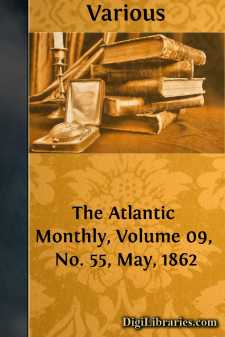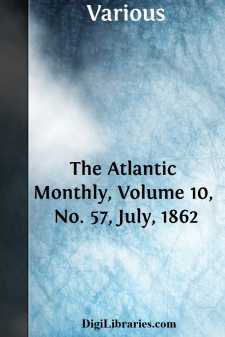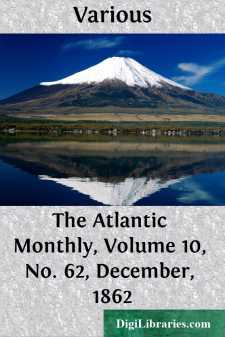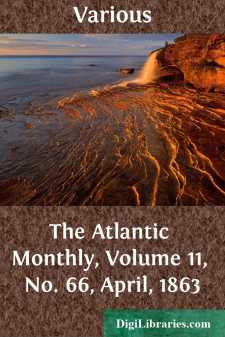Periodicals
- Art 27
- Children's periodicals 59
- Entertainment 5
- Food/Wine 2
- Games/Humor 455
- General 661
- Health 1
- History 53
- House/Home 1
- Regional 62
- Science/Nature 118
- Transportation 10
Periodicals Books
Sort by:
by:
Various
LETTER TO A YOUNG CONTRIBUTOR. My dear young gentleman or young lady,—for many are the Cecil Dreemes of literature who superscribe their offered manuscripts with very masculine names in very feminine handwriting,—it seems wrong not to meet your accumulated and urgent epistles with one comprehensive reply, thus condensing many private letters into a printed one. And so large a proportion of...
more...
by:
Various
MAN UNDER SEALED ORDERS. A vessel of war leaves its port, but no one on board knows for what object, nor whither it is bound. It is a secret Government expedition. As it sets out, a number of documents, carefully sealed, are put in charge of the commander, in which all his instructions are contained. When far away from his sovereign, these are to be the authority which he must obey; as he sails on in...
more...
by:
Various
SOME SOLDIER-POETRY. It is certain that since the time of Homer the deeds and circumstances of war have not been felicitously sung. If any ideas have been the subject of the strife, they seldom appear to advantage in the poems which chronicle it, or in the verses devoted to the praise of heroes. Remove the "Iliad," the "Nibelungenlied," some English, Spanish, and Northern ballads, two...
more...
by:
Various
AUTUMNAL TINTS. Europeans coming to America are surprised by the brilliancy of our autumnal foliage. There is no account of such a phenomenon in English poetry, because the trees acquire but few bright colors there. The most that Thomson says on this subject in his "Autumn" is contained in the lines,вÐâ "But see the fading many-colored woods, Shade deepening over shade, the...
more...
by:
Various
WILD APPLES. THE HISTORY OF THE APPLE-TREE. It is remarkable how closely the history of the Apple-tree is connected with that of man. The geologist tells us that the order of the Rosaceae, which includes the Apple, also the true Grasses, and the Labiatae, or Mints, were introduced only a short time previous to the appearance of man on the globe. It appears that apples made a part of the food of that...
more...
by:
Various
THE NEW GYMNASTICS. Physical culture is on the top of the wave. But the movement is as yet in the talk stage. Millions praise the gymnasium; hundreds seek its blessings. Similar incongruities make up the story of human life. But in this case inconsistency is consistent. Evidences of physical deterioration crowd upon us. Fathers and mothers regard their children with painful solicitude. Not even...
more...
by:
Various
THE PROCESSION OF THE FLOWERS. In Cuba there is a blossoming shrub whose multitudinous crimson flowers are so seductive to the humming-birds that they hover all day around it, buried in its blossoms until petal and wing seem one. At first upright, the gorgeous bells droop downward, and fall unwithered to the ground, and are thence called by the Creoles "Cupid's Tears." Frederika Bremer...
more...
by:
Various
HAPPIEST DAYS. Long ago, when you were a little boy or a little girl,—perhaps not so very long ago, either,—were you never interrupted in your play by being called in to have your face washed, your hair combed, and your soiled apron exchanged for a clean one, preparatory to an introduction to Mrs. Smith, or Dr. Jones, or Aunt Judkins, your mother's early friend? And after being ushered in to...
more...
by:
Various
CHRISTOPHER NORTH. Plutarch, when about to enter upon the crowded lives of Alexander and Caesar, declares his purpose and sets forth the true nature and province of biography in these words:—"It must be borne in mind that my design is not to write histories, but lives. And the most glorious exploits do not always furnish us with the clearest discoveries of virtue or vice in men. Sometimes a...
more...
by:
Various
ON THE VICISSITUDES OF KEATS'S FAME. [Joseph Severn, the author of the following paper, scarcely needs introduction to the readers of the "Atlantic Monthly"; but no one will object to reperusing, in connection with his valuable contribution, this extract from the Preface to "Adonais," which Shelley wrote in 1821:— "He [Keats] was accompanied to Rome and attended in his last...
more...











